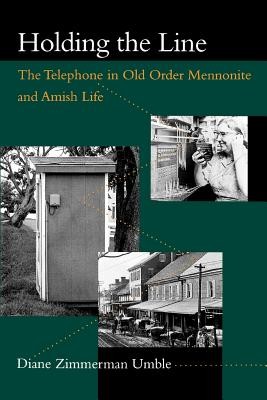
- We will send in 10–14 business days.
- Author: Diane Zimmerman Umble
- Publisher: Johns Hopkins University Press
- ISBN-10: 0801863759
- ISBN-13: 9780801863752
- Format: 15.3 x 22.9 x 1.8 cm, softcover
- Language: English
- SAVE -10% with code: EXTRA
Reviews
Description
Among the Old Order Mennonite and Amish communities of Lancaster County, Pennsylvania, the coming of the telephone posed a serious challenge to the longstanding traditions of work, worship, silence, and visiting. In 1907, Mennonites crafted a compromise in order to avoid a church split and grudgingly allowed telephones for lay people while prohibiting telephone ownership among the clergy. By 1909, the Amish had banned the telephone completely from their homes. Since then, the vigorous and sometimes painful debates about the meaning of the telephone reveal intense concerns about the maintenance of boundaries between the community and the outside world and the processes Old Order communities use to confront and mediate change.
In Holding the Line, Diane Zimmerman Umble offers a historical and ethnographic study of how the Old Order Mennonites and Amish responded to and accommodated the telephone from the turn of the twentieth century to the present. For Old Order communities, Umble writes, appropriate use of the telephone marks the edges of appropriate association -- who can be connected to whom, in what context, and under what circumstances. Umble's analysis of the social meaning of the telephone explores the effect of technology on community identity and the maintenance of cultural values through the regulation of the means of communication.
EXTRA 10 % discount with code: EXTRA
The promotion ends in 18d.04:33:47
The discount code is valid when purchasing from 10 €. Discounts do not stack.
- Author: Diane Zimmerman Umble
- Publisher: Johns Hopkins University Press
- ISBN-10: 0801863759
- ISBN-13: 9780801863752
- Format: 15.3 x 22.9 x 1.8 cm, softcover
- Language: English English
Among the Old Order Mennonite and Amish communities of Lancaster County, Pennsylvania, the coming of the telephone posed a serious challenge to the longstanding traditions of work, worship, silence, and visiting. In 1907, Mennonites crafted a compromise in order to avoid a church split and grudgingly allowed telephones for lay people while prohibiting telephone ownership among the clergy. By 1909, the Amish had banned the telephone completely from their homes. Since then, the vigorous and sometimes painful debates about the meaning of the telephone reveal intense concerns about the maintenance of boundaries between the community and the outside world and the processes Old Order communities use to confront and mediate change.
In Holding the Line, Diane Zimmerman Umble offers a historical and ethnographic study of how the Old Order Mennonites and Amish responded to and accommodated the telephone from the turn of the twentieth century to the present. For Old Order communities, Umble writes, appropriate use of the telephone marks the edges of appropriate association -- who can be connected to whom, in what context, and under what circumstances. Umble's analysis of the social meaning of the telephone explores the effect of technology on community identity and the maintenance of cultural values through the regulation of the means of communication.


Reviews